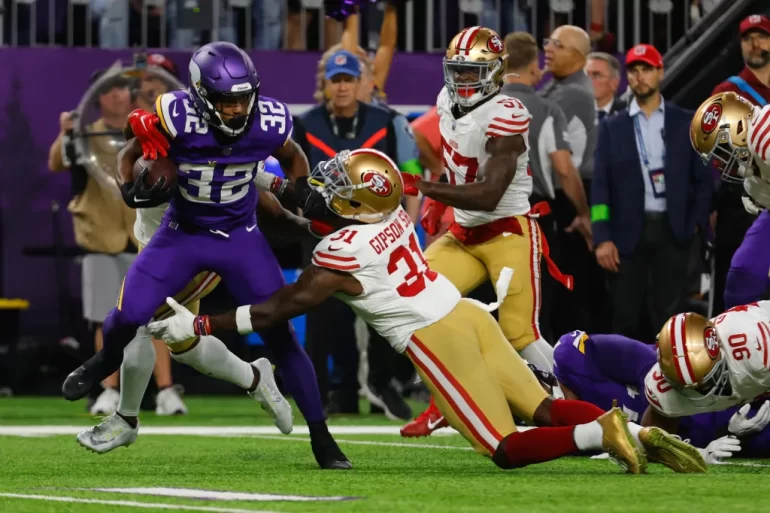San Francisco 49ers defensive coordinator Steve Wilkes regrets his costly blitz in Monday night’s loss to the Vikings.

San Francisco 49ers defensive coordinator Steve Wilkes, after mulling over his key decision for several days, expressed his willingness to reconsider after a total offense returned a 60-yard field goal before pause. The team lost to the Minnesota Vikings on Monday night.
Wilkes spoke to reporters for the first time since the 49ers lost 22-17, and while apologizing, he made it clear he would choose a different strategy if given a second chance.
He took full responsibility for the fateful decision, stressed the need to get his players fit and accepted the responsibility to improve.
In his own words, “I want to come back, but I have to do it better again.”
The decisive play came with 16 seconds left in the second quarter.
The Vikings faced a third-and-6 situation at their own 40-yard line with no timeouts. They were happy with short passes and wanted to score tries. Sensing an opportunity, the 49ers scrambled before the offense, forcing Vikings quarterback Kirk Cousins to check a deep pass to rookie quarterback Jordan Addison.
Unfortunately, Wilkes orchestrated an entire offense called the “zero blitz,” sending seven linebackers behind Cousins and leaving the defensive backs with minimal support if the pressure didn’t get to the linebackers.
Cousins’ throw was short, and Niners cornerback Charvarius Ward appeared to secure the interception.
But Addison was able to keep the ball away from Ward and ran into the end zone for a 60-yard touchdown, extending Minnesota’s lead to 16-7.
After the game, Niners coach Kyle Shanahan expressed his displeasure with the play calling, discussing the prospects and reviewing the strategy.
During this debate, Wilkes admitted his mistake. Shanahan explained that his issue wasn’t Wilkes’ zero blitz concept or aggressive approach, but timing and situational awareness.
According to NFL Next Gen Stats, it was the first time since Week 11 of 2020 that a seven-man pass rush was attempted in the final 30 seconds of a half in enemy territory.
Shanahan pointed out that there’s usually no problem when there’s no blitz at all, especially when the opponent needs a significant yard, but in this case it was a bad call with just 16 seconds left.
Addison’s long touchdown drew the most attention, but it also highlighted the defense’s continued struggles, particularly in the pass rush.
Despite ranking third in the league in interceptions (11) and points allowed per game (15.6), the 49ers have fallen behind despite taking significant salary on their defensive line.
Wilkes is in his first year as defensive coordinator and succeeds DeMeco Ryans, who was the head coach of the Houston Texans this season. The hope in hiring Wilkes was to maintain the defensive philosophy of Ryans and his predecessor, Robert Saleh, while adding potential new prospects due to his history coaching the defense. Since Shanahan arrived in 2017, the 49ers have relied heavily on pressure and zone coverage from their front end.
Under Wilkes, the Niners have allowed opponents to shoot 24.3 percent this season, 15th in the league and second-most since Shanahan took over.
But that growth rate isn’t significantly higher than Ryan’s 22.8 percent in 2022, and the 49ers have had trouble sacking quarterbacks despite their defensive scheme.
Wilkes noted that pass rush and coverage are intertwined, and he’s still working on understanding when to use certain blitzes and other calls given the unique nature of the 49ers’ defense.
He promised the coaching staff and players not to panic.






